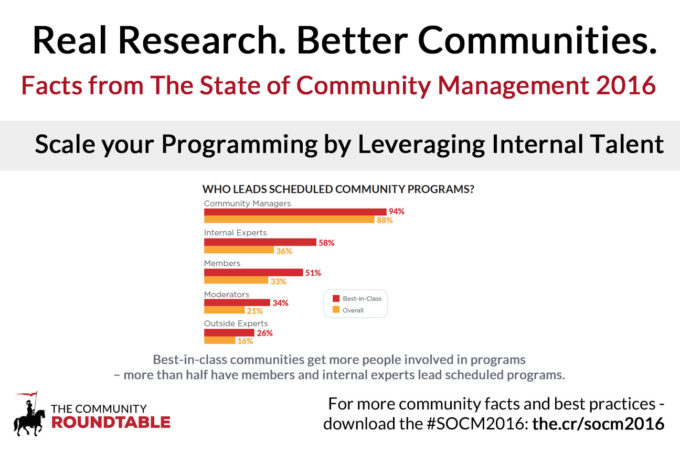By Ted McEnroe, Director of Research and Training

You start a community. It’s awesome. People engage, share ideas and provide value. You moderate, plan, provide tech support, train, encourage, goad, scold, backchannel and do about 37 other things, and that’s just before lunch.
And it works. Your reward? The community gets more active. More people. More onboarding. More moderation. More programming. More of everything. Except you.
Let’s face it – a lack of “human capital” can play a huge role in slowing the growth of a community, and it’s only the most forward-thinking organizations that preemptively add capacity. That means it’s up to you to make the case for help, even as you do more of everything. But it turns out there is one resource that is willing, eager and able and often goes untapped. Your current community.
The State of Community Management 2016 finds that our most successful communities, the “Best in Class”, did a better job of tapping into the talent already in their systems to take a more active role in a number of areas, including community programs.

To put it another way:
- Best-in-class communities are 61% more likely to tap internal experts to lead programs.
- They are 59% more likely to tap members.
- They’re 62% more likely to tap moderators.
- And 63% more likely to bring in outside experts.
And they do it all while holding relatively the same frequency of programming as their less-advanced peers. In other words, the best communities don’t offer more community programs than their peers, they just bring a wider variety of voices and expertise into that programming.
This is powerful for a number of reasons.
It helps you scale yourself. Running a single program is a lot of work. Running every community program is overwhelming. Bringing in your community to help is a great opportunity to redistribute a little from your plate and let you tackle some other things.
It can strengthen your members’ commitment. What are members more likely to pay greater attention to… a community where someone else does all the work or one where they, too, have made an investment in the success of the community?
It provides valuable skills for members, and you. Being able to present effectively is a powerful skill. Being able to practice it in the community can help people grow not just as members, but as professionals. And managing the program strategy is a great skill for a community manager interested in moving up in their own career.
You don’t know everything. Turns out you know community as well as anyone. But there are experts who know way more about many other topics and can bring insights and questions to the table you might not think of.
It introduces skeptics and outsiders to the community. Want someone to take a greater interest in the community? Having them present is a great way to get them connected with members and see what it’s about – and do it from their comfort zone.
It’s better for you, and better for your community. So who are your untapped experts?
We can’t wait to hear what you think – tag your thoughts with #SOCM2016 to join the conversation!
Are you a member of TheCR Network? Download the research inside the Network here.
